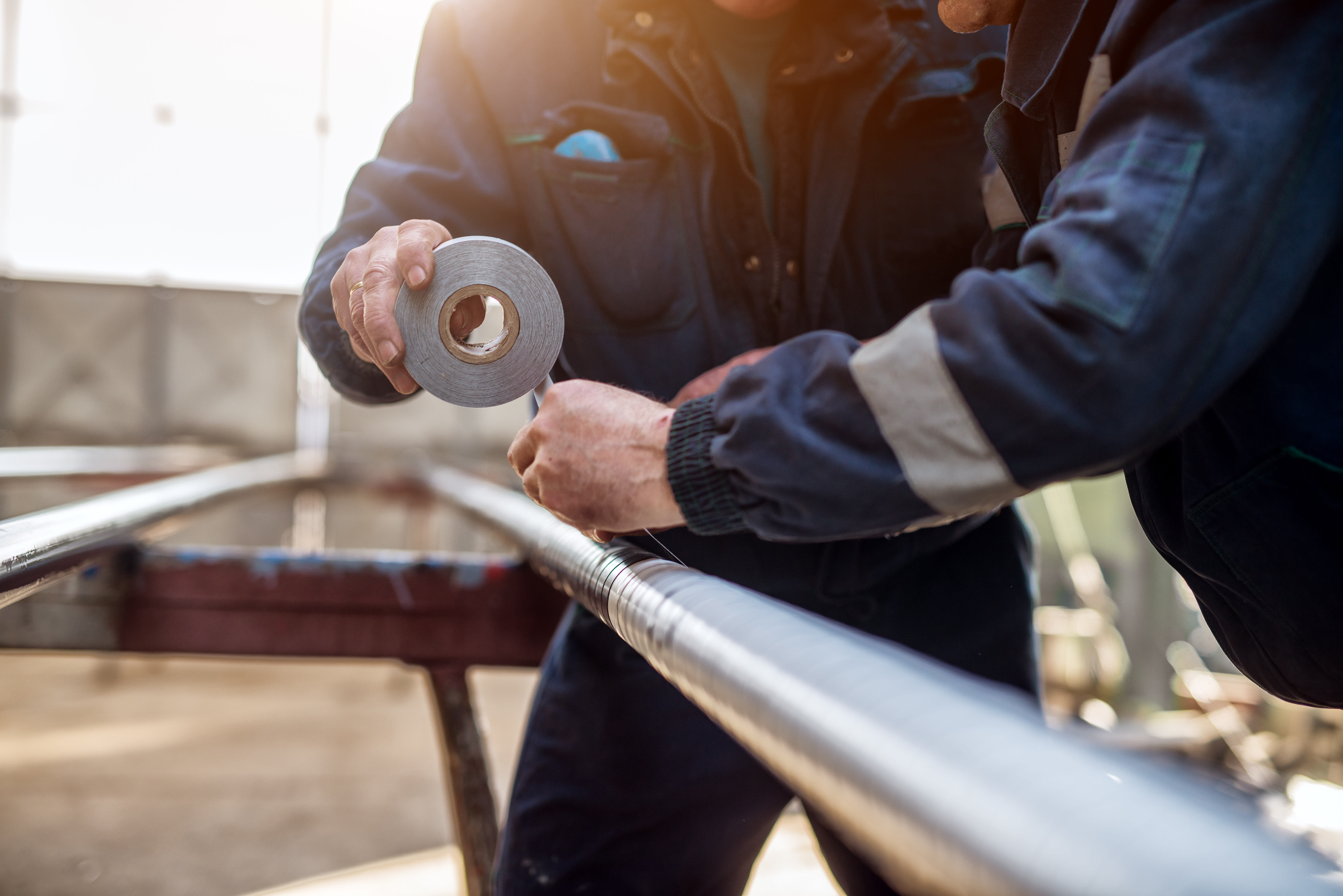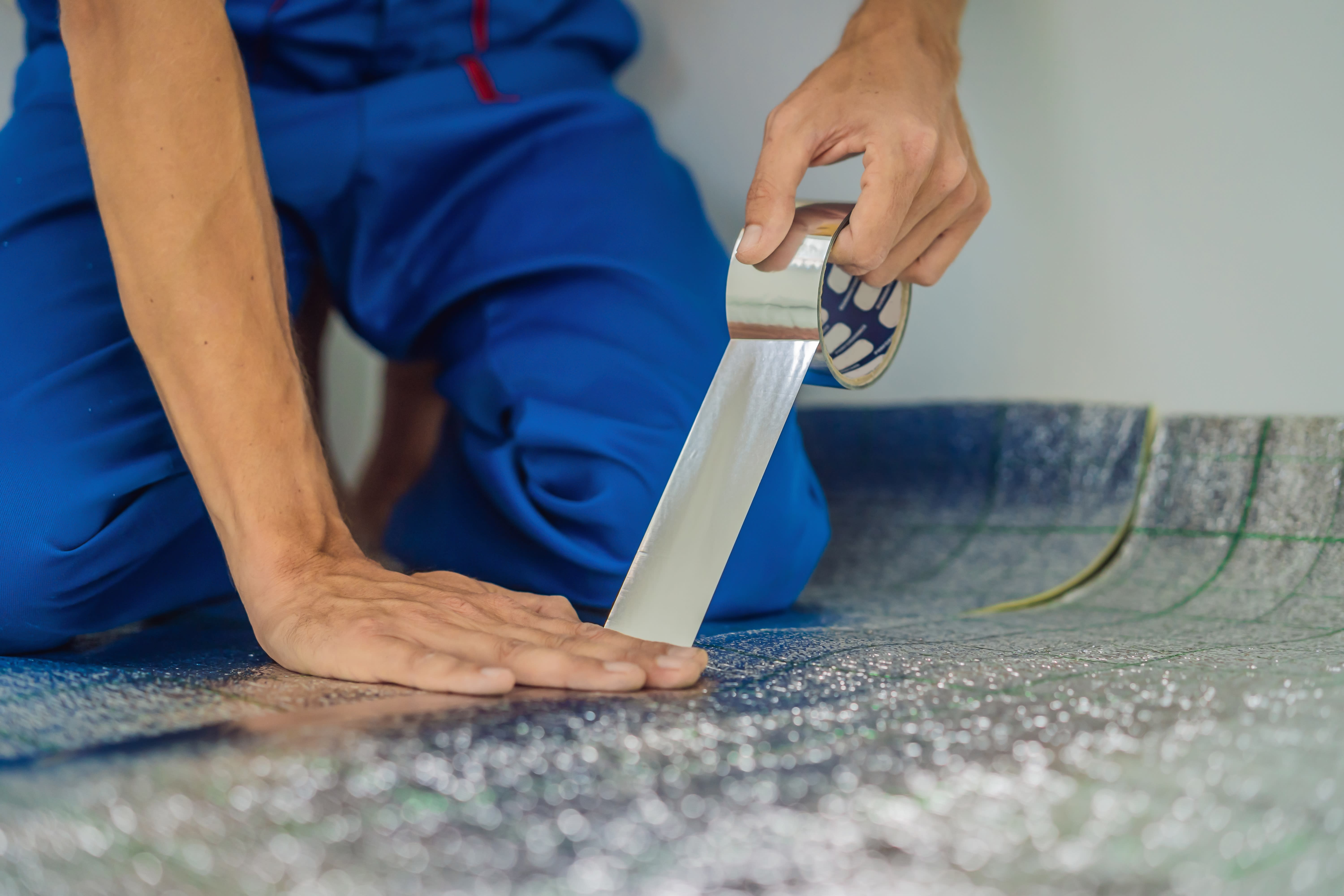- Published 9 Jan 2024
- Last Modified 6 Mar 2024
- 8 min
Industrial Tape Solutions and Their Usage
Explore RS Australia's range of industrial tape solutions, including heat resistant and electrical insulation types, for diverse applications.

When it comes to industrial and manufacturing work, tapes stand as crucial elements. They serve a range of functions, exceeding simple binding purposes. This article aims to shed light on the varied types of tapes and the key practices for their effective application. Reflecting significant innovation, the tape industry has evolved, presenting specialised solutions for specific industrial needs. These tapes are designed not only for strong adhesion but also to endure extreme environmental conditions, including varying levels of heat and moisture.
When it comes to selecting the appropriate tape for a specific task, a detailed understanding of its material characteristics, adhesive strength, and environmental compatibility is vital. Furthermore, the technique of application is equally critical, as it directly influences the tape's functionality and effectiveness.
Considering factors like durability and safety is essential in the tape selection process. This includes being aware of the lifespan of different tapes and how they may degrade under various conditions, a concern especially significant in harsh climates. As we explore further, this article will introduce you to the variety of tapes available, from the commonplace to the highly specialised, and discuss the pivotal factors that play a role in their selection and application.

Understanding the Various Types of Adhesive Tapes and Their Usage
In exploring the diverse range of tapes, it's essential to categorise them based on their unique characteristics and specific industrial applications. From everyday use to highly specialised scenarios, tapes offer a multitude of solutions. This section explores the different types of tapes, highlighting their uses and the factors that make each one suitable for its intended purpose.
Common Tapes: Masking, Duct, & Electrical
At the foundational level, common tapes such as masking, duct, and electrical are staples in various workplace settings. Each serves a unique role:
- Masking Tape: Ideal for painting and decorating, these tapes provide easy removability and surface protection.
- Duct Tape: Known for its robustness, duct tape is widely used for repairs that demand strength and durability.
- Electrical Tape: These tapes, including varieties like PVC electrical tape, are crucial for the insulation and safeguarding of electrical wires, offering flexibility and resistance to elements.
Specialised Tapes: Thermal, VHB, PTFE, & Foil
Beyond the common types, the range of industrial tape solutions extends to specialised varieties tailored for specific tasks:
- Thermal Conductive Tape: Utilised in electronics for heat management.
- Very High Bond (VHB) Tape: These offer a strong bond, ideal for applications requiring high adhesive strength.
- Foil Tape: Often used for sealing and insulation in HVAC systems, these tapes provide durability and are resistant to moisture and temperature variations.
- Polytetrafluoroethylene (PTFE) Tape: Best known for their use in plumbing to seal pipe threads, PTFE tapes provide a reliable, watertight seal and are resistant to a wide range of chemicals, making them suitable for a variety of applications.
Factors to Consider
When selecting a tape, several key factors must be considered:
- Backing Material: Determines the tape's flexibility, strength, and resistance to environmental factors.
- Adhesive Type: Affects the tape's bonding strength, durability, and suitability for different surfaces.
- Performance Characteristics: Include temperature resistance, electrical conductivity, and UV stability, which ensure the tape performs as required in its specific application.

Getting the Best Out of Your Industrial Tape Solution
Achieving the maximum effectiveness from tape applications requires attention to detail in several key areas. This part of our discussion focuses on the best practices for tape application, ensuring that the chosen tape not only adheres properly but also performs its intended function optimally under various conditions.
Ensuring Optimal Adhesion
The foundation of effective tape application lies in proper surface preparation. This includes:
- Cleaning: Remove dust, grease, or moisture from the surface to ensure a clean bonding area.
- Surface Texture: Assess and, if necessary, modify the surface texture to improve tape adhesion.
- Priming: Applying a primer in some cases to enhance the bond strength between the tape and the surface.
From Tension to Overlapping
The method of tape application is critical to its performance:
- Tension Control: Applying the tape with the right amount of tension to avoid wrinkles and ensure uniform adhesion.
- Alignment: Ensuring the tape is aligned correctly for a neat and effective application.
- Overlapping: When necessary, overlapping tape strips correctly to maintain integrity and continuity of insulation or sealing.
Temperature, Humidity, and Surface Material
The environment in which the tape is applied and used can greatly affect its performance:
- Temperature: Understanding the optimal temperature range for both application and ongoing use of the tape.
- Humidity: Recognising the impact of humidity on adhesive properties and choosing tapes accordingly.
- Surface Material: Match the tape to the material it's being applied to, whether it's metal, plastic, or any other material’s surface, to ensure compatibility and longevity.
Ensuring Safety and Durability with Tapes
In the context of tape applications, considering the unique and diverse climatic conditions of Australia is crucial for ensuring both safety and durability. Australia's climate varies widely, from tropical in the north to temperate in the south and includes arid and semi-arid zones. This variability presents unique challenges for the use of tapes.
Understanding Tape Lifespan and Degradation Factors
In Australia, tapes must withstand a broad range of environmental stresses:
- Extreme Heat and Sunlight: In arid and semi-arid regions, intense heat and UV exposure can accelerate the degradation of various tape types, affecting their adhesive properties and material integrity.
- Humidity and Moisture: In tropical areas, high humidity can impact the adhesive quality of tapes, making them less effective.
- Temperature Fluctuations: In temperate zones, frequent temperature changes can cause tapes to expand and contract, potentially weakening their adhesive bond over time.
Best Practices in Storage and Handling
Adapting storage and handling practices to suit the Australian climate is vital:
- Temperature-Controlled Storage: In areas with extreme heat, storing tapes in a temperature-controlled environment can help preserve their quality.
- Moisture Prevention: In humid regions, storing tapes in airtight containers can prevent moisture absorption.
- Protection from Sunlight: Regardless of the region, tapes should be stored away from direct sunlight to prevent UV damage.
Recognising and Avoiding Common Mistakes
Being aware of the common mistakes specifically in relation to Australia's climate is important:
- Ignoring Local Climate Factors: Not considering the local climatic conditions when selecting and applying tapes can lead to premature failure.
- Improper Application in Extreme Conditions: Applying tapes during periods of extreme temperature or humidity can affect their initial adhesion and long-term performance.
- Overlooking Regional Specificities: Each Australian region has its unique challenges, and tape selection should be tailored accordingly.
Harnessing the Full Potential of Tapes with RS's Range
In this exploration of tapes, we've seen their indispensable role in a multitude of applications. From general tasks to complex industrial processes, the effectiveness of tapes is influenced by the right selection and application, a principle that holds true across Australia's diverse climatic regions.
Australia's climate varies from tropical in the north to temperate in the south, with arid regions as well. Each of these environments presents unique challenges for tape applications. Whether it's the humidity of coastal areas, the temperature fluctuations in temperate zones, or the dry conditions in arid regions, selecting the right tape is crucial for ensuring performance and longevity.
The range of tape solutions offered by RS is designed to meet these varied needs. Our collection includes options like electrical insulation tapes, heat resistant tapes, and thermal conductive tapes, all tailored to perform under different environmental conditions. This variety ensures that, regardless of the specific climate challenges faced, there is a type available that delivers both efficiency and reliability.
By considering RS's comprehensive tape selection, one can find solutions that are adeptly suited to the unique demands of Australia's varied climates, ensuring optimal tape adhesiveness in any setting.
Popular Tape Brands
RS PRO
RS PRO offers a versatile selection of industrial tapes that are suitable for a variety of applications. Their solutions include tapes designed for sealing, binding, and insulation, available in multiple sizes and colours to meet different industrial requirements. These tapes are recognised for their durability and strong adhesion properties.
HellermannTyton
HellermannTyton is distinguished for its innovative range of adhesive tape solutions, serving a wide array of industrial purposes. Their lineup features specialised tapes for cable management, bundling, and protection, each engineered with precision for specific industrial needs. HellermannTyton's tapes are celebrated for their exceptional strength and flexibility, making them indispensable in various demanding industrial environments.
3M
3M's extensive tape range caters to various industrial and manufacturing needs. Their solutions include tapes for bonding, mounting, packaging, and more, each engineered for specific applications. 3M tapes are valued for their versatility and high performance in diverse industrial environments.
Related links
- Electronic Sounders
- Safety Across the Mining Supply Chain: Emergency Stop Switches
- Breathing Easy: The Essential Guide to Air Quality and Humidity...
- Essential PPE Workwear for Various Home Tasks
- Crow Bars
- A Complete Guide to Anemometers
- Everything You Need To Know About Duct Tape
- A Complete Guide to Magnetic Tape